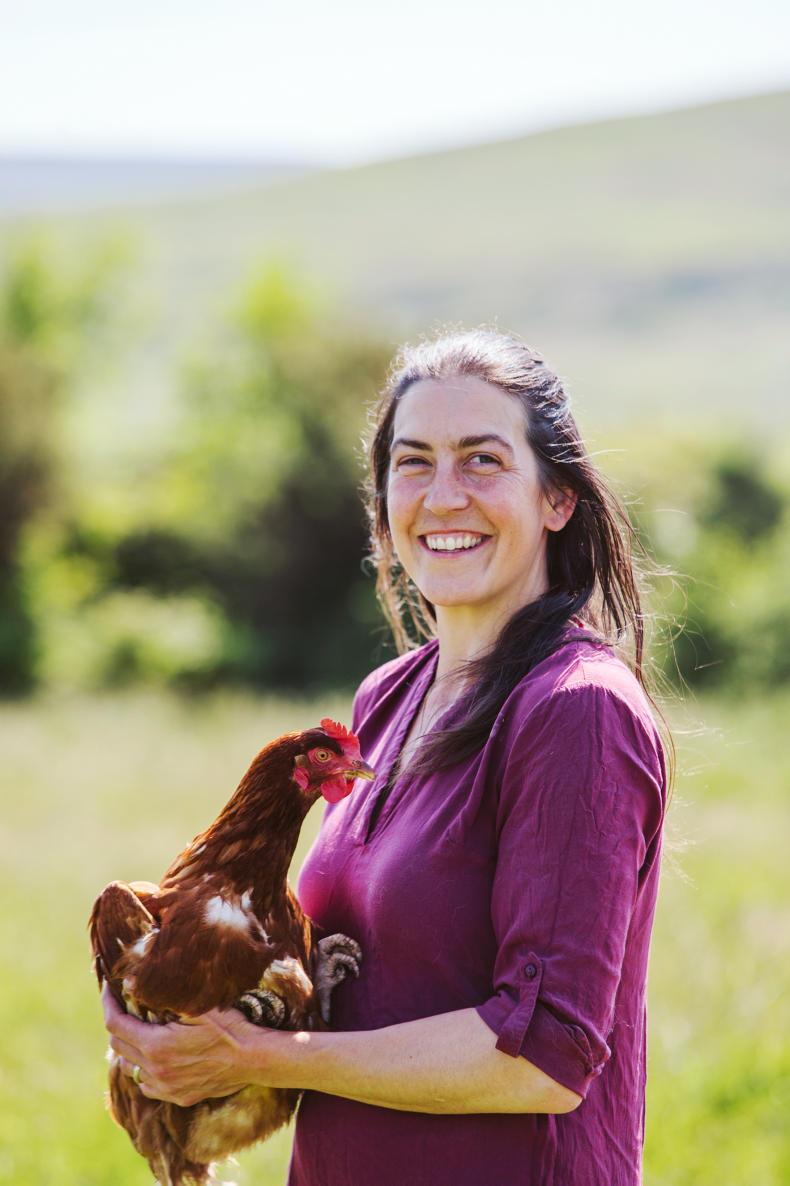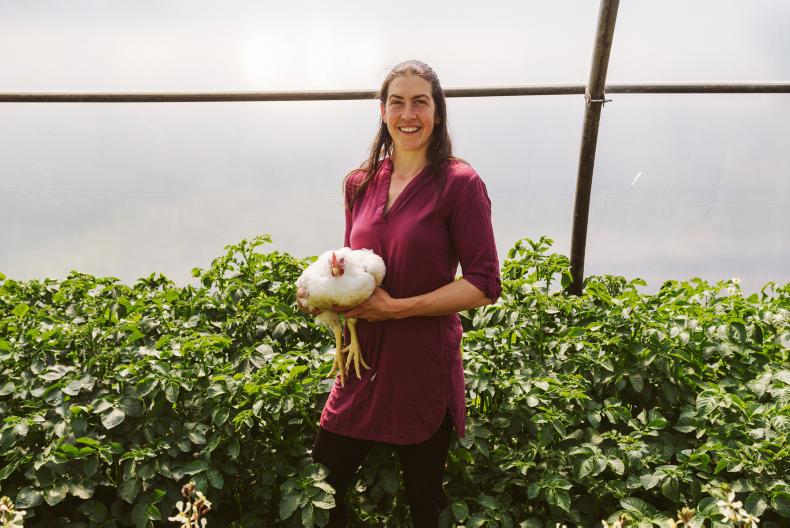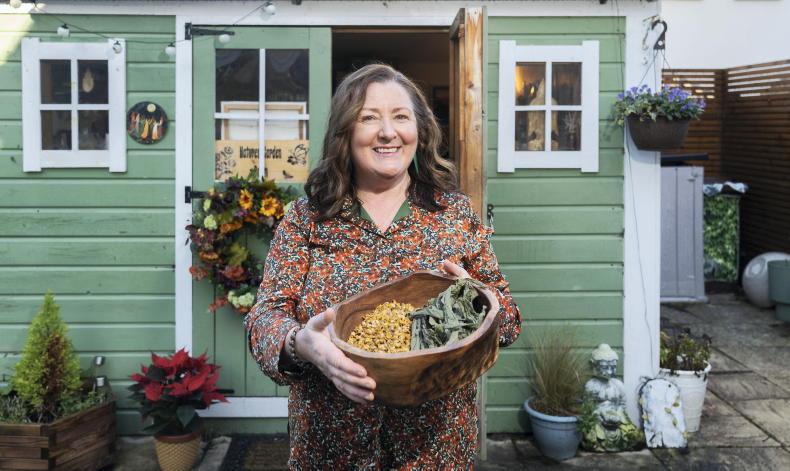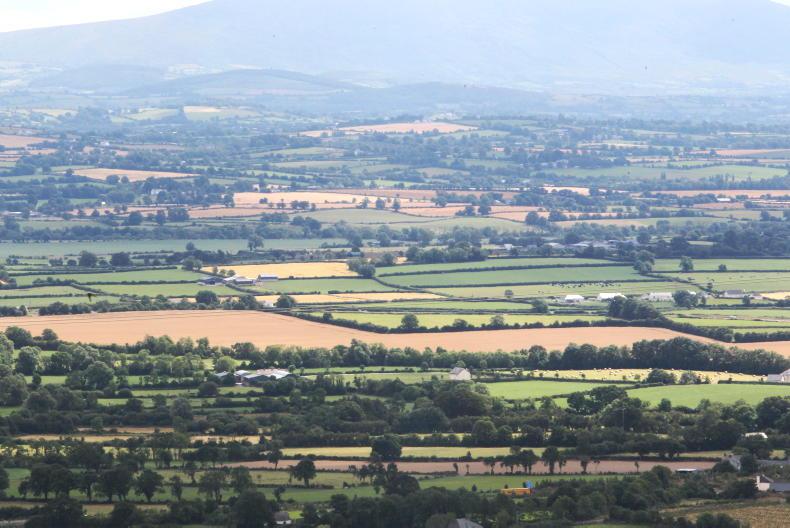Clotilde Kiely’s path to becoming a farmer is certainly not the well-trodden one.
First of all, while she rears poultry in the heart of the Comeraghs, she is originally from Paris. And the land she now farms, she bought herself in 2016, to start her flock from scratch.
But?
“If you have a conviction and a passion, just follow it,” says Clotilde. “Plan, well, planning is very important, and everything is possible. Don’t let anybody tell you it’s not.”
From France to Ireland
While Clotilde spent her early childhood in Fontainebleau, south of Paris, she moved to the countryside at 10 when her parents – a physiotherapist and a microbiologist – decided to take on her father’s family farm.
This move, she maintains “was the making of me”.

Clotilde established Comeragh Mountain Poultry in 2016. \ Claire Jeanne Nash
“I’ve always had a big issue in the urban environment,” says Clotilde, explaining that she was an anxious child who struggled in crowded areas.
“It completely transformed me and helped me to be at ease in an environment where I was much more confident.”
Far from a traditional Irish farm, however, Clotilde’s family focused on forestry and game, such as wild boar and deer. And life revolved around the kitchen table.
“Every time we finished a lunch or a dinner, the question was, ‘So what are we going to eat next?’” she laughs.
It’s not surprising then that at 15 years of age, Clotilde went to a technical secondary school that specialised in agriculture, going on to complete her studies in animal husbandry. As part of the course, a placement in a foreign country was required, and with an interest in horses, she found herself working with a trainer in Dungarvan in 2001, but returned home to France 10 months later.

A Pyreneese mountain dog helps to keep the poultry safe. \ Claire Jeanne Nash
She explains that due to the nature of her family’s farm, there was no “viable” future there, so she decided to work towards becoming a farm advisor, getting a job in a pig farm to build up her experience.
However, as a young woman in her 20s, she found rural life in France a lot lonelier than Ireland.
“Within six months, I decided I didn’t really settle well in France and that if I did want to work in farming, I’d have to get married to the pig sty fella; and I didn’t want that!” she laughs. “So I decided I was going to come back to Ireland.”
Making a dream a reality
Shortly after returning, Clotilde began working in the cattle office of Dawn Meats. Soon after, she met her future husband, David Kiely, who was a butcher in his family’s business in Waterford, and went on to have their children, Eloise (now eight) and Juilette (seven).
In the intervening years, Clotilde also worked a series of office jobs, but never let go her dream of farming. She got a polytunnel for the back garden to grow her own tomatoes and took three hens from her brother-in-law to have her own eggs; but wanted something more substantial.
Sadly, the catalyst came through a personal loss, when Clotilde’s mother died, leaving her an inheritance. This meant that Clotilde now had the finance she needed to make her life-long ambition a reality.

Clotilde rears chickens, turkeys, ducks and geese at Comeragh Mountain Poultry. \ Claire Jeanne Nash
“In this really sad event, it was also something that helped us realise a dream,” she says, but adds that it “took me a little while to actually understand what I wanted to do.”
The answer, it turned out, was thinking back to what she missed most from her childhood.
“My parents used to buy these farm chickens from an old lady who would rear them in a batch of 100 and slaughter all of them and then each family would buy 20 and put them in their freezer, so I was really missing that,” she says, explaining that her first idea was to purchase the field beside their home to start-up.

Originally from France, Clotilde made her dream of becoming a farmer a reality in the heart of the Comergh Mountains. \ Claire Jeanne Nash
When that did not work out, however, she looked a little further, and found 16ac in Kilbrien, on the western side of the Comeragh Mountains.
“So where we are now is only 10 minutes to where we were before, but it was in an affordable mountain area where nobody had [shown] any interest in a long time,” says Clotilde, explaining that while the site was exposed and boggy in places, she could see its potential, with its flat pastures and accessibility to the N25.
“It’s not because no one has done it before, that it can’t be done,” she says.
Starting from scratch
Clotilde says it took about a year to make the plan for the farm, starting with breaking open a roadway and setting out a small farmyard. She bought her first 22m × 10m veg polytunnel secondhand from Mount Congreve Gardens, followed by another second hand tunnel from another poultry keeper, to rear her first batch of 50 Bronze turkeys for Christmas 2016.
Indeed, she credits Irish poultry producers like Ronan Byrne in Galway and Mary Regan of Regan Organic Farm in Enniscorthy as a great support; for instance, advising her to go for the “Ross” breed when she got her first batch of broilers in 2017, rather than the French birds she had been planning on.

Clotilde rears her poultry slowly on pasture. \ Claire Jeanne Nash
“They kind of brought me back to reality as to what the Irish market is looking for,” says Clotilde, explaining that the main appeal of the Ross is its large breast.
However, she admits that rearing poultry was a “steep learning curve”.
“A lot can go wrong,” she says, explaining that chickens can be “very finicky” and it was hard initially to judge what conditions they were most comfortable with in the brooding house.
One thing she was sure of, however, was specialising in “pasture-reared” poultry, rather than branding as “free range”, as she “had no interest in going into a saturated market.”
Clotilde never has more than 300 chickens at a time, reared to 10-12 weeks, initially in the brooding house before being brought to graze on pasture, kept medicine-free and fed on a varied diet of pellets, grain, grass and bugs, as well as old salads and vegetables. 
Clotilde produces about 1,200 chickens a year. \ Claire Jeanne Nash
Today, she produces about 1,200 oven-ready chickens a year, along with 200 ducks and approximately 150 heritage turkeys and 25 geese for the Christmas market. All bar the ducks and geese are currently slaughtered at Crowe’s in Tipperary (the others go to Skeaghanore Duck in west Cork), before returning to the farm, where they are labelled, weighed and frozen in a former container refitted as a cold room.
The average chicken will retail at €7/kg, with Clotilde selling direct to regular customers from the farm, but also at local markets in Dungarvan, Tramore and Ardmore, after her husband David left the butcher trade to come on board full time.
Diversity is key
The couple also produce and sell mixed salad leaves year round, both direct and through a local wholesaler, and seasonal veg, such as spinach, kale, heirloom tomatoes, beetroot, cucumbers, French beans, courgettes and pumpkins, along with their own French mustard dressing.
They also have given a platform to other local producers, which means that depending on the time of year, you might find carrots and parsnips from Ardmore, strawberries from Dungarvan or apples from Cappoquin.
In addition, they keep hens for eggs for the family and locals, but have not yet invested in an egg grading machine to supply the retail trade.
The COVID-19 crisis, of course, initially saw the closure of farmers’ markets, but Clotilde was able to adapt by offering box deliveries and selling direct from the farm. Long-term, her ambition is to have more people visit the farm and develop tours and agri-education initiatives.

Clotilde and her daughters on the family farm in Co Waterford. \ Claire Jeanne Nash
“Supermarkets have played a very big role in misinforming the consumer into the cost of food and I think my heart wants to try to show another picture of what the reality is for farmers,” she says.
This includes the long, hard hours that she and David have invested in Comeragh Mountain Poultry. While the inheritance was a leg up in buying the land, they have made other tough choices; for instance, while they initially put their house in Dungarvan on AirBnB for the first year while renting a house closer to the farm, they eventually made the call to sell up.
“I had to make a choice whether to go into the AirBnB business because it was taking all my time, or selling the house and keeping onto my farming project,” says Clotilde. “So at the moment, we have no house! But we have the farm.”
It’s still early days, of course, and Clotilde says they have yet to prove that their diverse farm model “can sustain our family over the years.”
“But it feels right and it seems that the demand is here for this frame of mind and this kind of produce,” she says.
Which brings us back to what she said at the start.
“Believe everything is possible,” she concludes.
For more, visit comeraghmountainfarm.ie or follow on Facebook.

Clotilde estimates that she has invested roughly €30,000 in infrastructure for her farm business to date, with all tunnels and poultry houses sourced secondhand. These costs include:
Groundwork and drainage: €3,000. First veg tunnel: €3,000. First poultry house: €3,500.Second poultry house: €1,500.Turkey shed: €6,500.Two insulated containers: €6,500.Cold room: €2,500.Second tunnel: €3,500.Other costs have included:
Hedging (for shelter and bio-diversity): €800. Forestry (2.5ac non-commercial native woodland scheme): €3,000. She credits National Organic Training Skillnet (NOTS) as well as the collective “Food the Waterford Way” for their support and encouragement.

Diversity
“Farmers should be encouraged to look at farming with a new outlook. The diversification of income could come from various approaches: direct sell (farm-to-fork), agro-tourism, accommodation, farm tours, “table d’hôte”, transformation of produces on the farm (cheeses, raw milk, curing meat, etc.), beekeeping, even agro-forestry. It may feel challenging to have to deal with other skills than farming, but it is also very rewarding to hear other people enjoying what you are producing/making.”
Food security in strange times
“Our globalised system is very fragile and can be upset drastically. When everything is shouting at us to stand back, look around and scale right down, we should focus on the production of wholesome, quality foods for communities around the country, encourage producing local, buying local, supporting each other.”
Self-belief
“Believe everything is possible. Farmers market and direct sell are ways of selling your produce, which are very flexible and allow scope to start up, evolve and improve on your system. Don’t let the regulation/paperwork frighten you. Start small and inform yourself prior to commencing in order to have things done the right way in regards to regulation. Ask for help and support from the local authority/HSE to set up the right way.”
Clotilde Kiely’s path to becoming a farmer is certainly not the well-trodden one.
First of all, while she rears poultry in the heart of the Comeraghs, she is originally from Paris. And the land she now farms, she bought herself in 2016, to start her flock from scratch.
But?
“If you have a conviction and a passion, just follow it,” says Clotilde. “Plan, well, planning is very important, and everything is possible. Don’t let anybody tell you it’s not.”
From France to Ireland
While Clotilde spent her early childhood in Fontainebleau, south of Paris, she moved to the countryside at 10 when her parents – a physiotherapist and a microbiologist – decided to take on her father’s family farm.
This move, she maintains “was the making of me”.

Clotilde established Comeragh Mountain Poultry in 2016. \ Claire Jeanne Nash
“I’ve always had a big issue in the urban environment,” says Clotilde, explaining that she was an anxious child who struggled in crowded areas.
“It completely transformed me and helped me to be at ease in an environment where I was much more confident.”
Far from a traditional Irish farm, however, Clotilde’s family focused on forestry and game, such as wild boar and deer. And life revolved around the kitchen table.
“Every time we finished a lunch or a dinner, the question was, ‘So what are we going to eat next?’” she laughs.
It’s not surprising then that at 15 years of age, Clotilde went to a technical secondary school that specialised in agriculture, going on to complete her studies in animal husbandry. As part of the course, a placement in a foreign country was required, and with an interest in horses, she found herself working with a trainer in Dungarvan in 2001, but returned home to France 10 months later.

A Pyreneese mountain dog helps to keep the poultry safe. \ Claire Jeanne Nash
She explains that due to the nature of her family’s farm, there was no “viable” future there, so she decided to work towards becoming a farm advisor, getting a job in a pig farm to build up her experience.
However, as a young woman in her 20s, she found rural life in France a lot lonelier than Ireland.
“Within six months, I decided I didn’t really settle well in France and that if I did want to work in farming, I’d have to get married to the pig sty fella; and I didn’t want that!” she laughs. “So I decided I was going to come back to Ireland.”
Making a dream a reality
Shortly after returning, Clotilde began working in the cattle office of Dawn Meats. Soon after, she met her future husband, David Kiely, who was a butcher in his family’s business in Waterford, and went on to have their children, Eloise (now eight) and Juilette (seven).
In the intervening years, Clotilde also worked a series of office jobs, but never let go her dream of farming. She got a polytunnel for the back garden to grow her own tomatoes and took three hens from her brother-in-law to have her own eggs; but wanted something more substantial.
Sadly, the catalyst came through a personal loss, when Clotilde’s mother died, leaving her an inheritance. This meant that Clotilde now had the finance she needed to make her life-long ambition a reality.

Clotilde rears chickens, turkeys, ducks and geese at Comeragh Mountain Poultry. \ Claire Jeanne Nash
“In this really sad event, it was also something that helped us realise a dream,” she says, but adds that it “took me a little while to actually understand what I wanted to do.”
The answer, it turned out, was thinking back to what she missed most from her childhood.
“My parents used to buy these farm chickens from an old lady who would rear them in a batch of 100 and slaughter all of them and then each family would buy 20 and put them in their freezer, so I was really missing that,” she says, explaining that her first idea was to purchase the field beside their home to start-up.

Originally from France, Clotilde made her dream of becoming a farmer a reality in the heart of the Comergh Mountains. \ Claire Jeanne Nash
When that did not work out, however, she looked a little further, and found 16ac in Kilbrien, on the western side of the Comeragh Mountains.
“So where we are now is only 10 minutes to where we were before, but it was in an affordable mountain area where nobody had [shown] any interest in a long time,” says Clotilde, explaining that while the site was exposed and boggy in places, she could see its potential, with its flat pastures and accessibility to the N25.
“It’s not because no one has done it before, that it can’t be done,” she says.
Starting from scratch
Clotilde says it took about a year to make the plan for the farm, starting with breaking open a roadway and setting out a small farmyard. She bought her first 22m × 10m veg polytunnel secondhand from Mount Congreve Gardens, followed by another second hand tunnel from another poultry keeper, to rear her first batch of 50 Bronze turkeys for Christmas 2016.
Indeed, she credits Irish poultry producers like Ronan Byrne in Galway and Mary Regan of Regan Organic Farm in Enniscorthy as a great support; for instance, advising her to go for the “Ross” breed when she got her first batch of broilers in 2017, rather than the French birds she had been planning on.

Clotilde rears her poultry slowly on pasture. \ Claire Jeanne Nash
“They kind of brought me back to reality as to what the Irish market is looking for,” says Clotilde, explaining that the main appeal of the Ross is its large breast.
However, she admits that rearing poultry was a “steep learning curve”.
“A lot can go wrong,” she says, explaining that chickens can be “very finicky” and it was hard initially to judge what conditions they were most comfortable with in the brooding house.
One thing she was sure of, however, was specialising in “pasture-reared” poultry, rather than branding as “free range”, as she “had no interest in going into a saturated market.”
Clotilde never has more than 300 chickens at a time, reared to 10-12 weeks, initially in the brooding house before being brought to graze on pasture, kept medicine-free and fed on a varied diet of pellets, grain, grass and bugs, as well as old salads and vegetables. 
Clotilde produces about 1,200 chickens a year. \ Claire Jeanne Nash
Today, she produces about 1,200 oven-ready chickens a year, along with 200 ducks and approximately 150 heritage turkeys and 25 geese for the Christmas market. All bar the ducks and geese are currently slaughtered at Crowe’s in Tipperary (the others go to Skeaghanore Duck in west Cork), before returning to the farm, where they are labelled, weighed and frozen in a former container refitted as a cold room.
The average chicken will retail at €7/kg, with Clotilde selling direct to regular customers from the farm, but also at local markets in Dungarvan, Tramore and Ardmore, after her husband David left the butcher trade to come on board full time.
Diversity is key
The couple also produce and sell mixed salad leaves year round, both direct and through a local wholesaler, and seasonal veg, such as spinach, kale, heirloom tomatoes, beetroot, cucumbers, French beans, courgettes and pumpkins, along with their own French mustard dressing.
They also have given a platform to other local producers, which means that depending on the time of year, you might find carrots and parsnips from Ardmore, strawberries from Dungarvan or apples from Cappoquin.
In addition, they keep hens for eggs for the family and locals, but have not yet invested in an egg grading machine to supply the retail trade.
The COVID-19 crisis, of course, initially saw the closure of farmers’ markets, but Clotilde was able to adapt by offering box deliveries and selling direct from the farm. Long-term, her ambition is to have more people visit the farm and develop tours and agri-education initiatives.

Clotilde and her daughters on the family farm in Co Waterford. \ Claire Jeanne Nash
“Supermarkets have played a very big role in misinforming the consumer into the cost of food and I think my heart wants to try to show another picture of what the reality is for farmers,” she says.
This includes the long, hard hours that she and David have invested in Comeragh Mountain Poultry. While the inheritance was a leg up in buying the land, they have made other tough choices; for instance, while they initially put their house in Dungarvan on AirBnB for the first year while renting a house closer to the farm, they eventually made the call to sell up.
“I had to make a choice whether to go into the AirBnB business because it was taking all my time, or selling the house and keeping onto my farming project,” says Clotilde. “So at the moment, we have no house! But we have the farm.”
It’s still early days, of course, and Clotilde says they have yet to prove that their diverse farm model “can sustain our family over the years.”
“But it feels right and it seems that the demand is here for this frame of mind and this kind of produce,” she says.
Which brings us back to what she said at the start.
“Believe everything is possible,” she concludes.
For more, visit comeraghmountainfarm.ie or follow on Facebook.

Clotilde estimates that she has invested roughly €30,000 in infrastructure for her farm business to date, with all tunnels and poultry houses sourced secondhand. These costs include:
Groundwork and drainage: €3,000. First veg tunnel: €3,000. First poultry house: €3,500.Second poultry house: €1,500.Turkey shed: €6,500.Two insulated containers: €6,500.Cold room: €2,500.Second tunnel: €3,500.Other costs have included:
Hedging (for shelter and bio-diversity): €800. Forestry (2.5ac non-commercial native woodland scheme): €3,000. She credits National Organic Training Skillnet (NOTS) as well as the collective “Food the Waterford Way” for their support and encouragement.

Diversity
“Farmers should be encouraged to look at farming with a new outlook. The diversification of income could come from various approaches: direct sell (farm-to-fork), agro-tourism, accommodation, farm tours, “table d’hôte”, transformation of produces on the farm (cheeses, raw milk, curing meat, etc.), beekeeping, even agro-forestry. It may feel challenging to have to deal with other skills than farming, but it is also very rewarding to hear other people enjoying what you are producing/making.”
Food security in strange times
“Our globalised system is very fragile and can be upset drastically. When everything is shouting at us to stand back, look around and scale right down, we should focus on the production of wholesome, quality foods for communities around the country, encourage producing local, buying local, supporting each other.”
Self-belief
“Believe everything is possible. Farmers market and direct sell are ways of selling your produce, which are very flexible and allow scope to start up, evolve and improve on your system. Don’t let the regulation/paperwork frighten you. Start small and inform yourself prior to commencing in order to have things done the right way in regards to regulation. Ask for help and support from the local authority/HSE to set up the right way.”


















SHARING OPTIONS